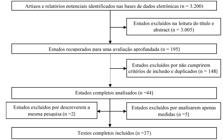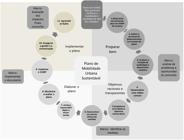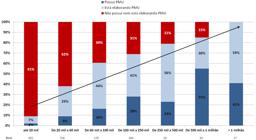Baeten (2000)Baeten, G. (2000). The tragedy of the highway: empowerment, disempowerment and the politics of sustainability discourses and practices. European Planning Studies, 8(1), 69-86. http://dx.doi.org/10.1080/096543100110938.
http://dx.doi.org/10.1080/09654310011093...
|
Reino Unido |
11
|
|
|
European Comission (EC, 2001aEuropean Comission – EC. (2001a). Urban transport: thematic synthesis of transport research results (Vol. 7). Paper 5 of 10. Extra project (final). 99 p. Recuperado em maio de 2015, de http://www.ocs.polito.it/biblioteca/mobilita/UrbanTransportEXTRA.pdf
http://www.ocs.polito.it/biblioteca/mobi...
) |
Bélgica |
|
|
| European Commission (EC, 2001bEuropean Comission – EC. (2001b). White paper: European transport policy for 2010: time to decide. Luxembourg: Office for Official Publications of the European Communities. 126 p.) |
Bélgica |
|
|
May et al. (2003)May, A. D., Jopson, A. F., & Matthews, B. (2003). Research challenges in urban transport policy. Transport Policy, 10(3), 157-164. http://dx.doi.org/10.1016/S0967-070X(03)00039-8.
http://dx.doi.org/10.1016/S0967-070X(03)...
|
Reino Unido |
|
|
|
May (2003)May, A. D. (2003). Developing sustainable urban land use and transport strategies: a decision makers’ guidebook: prospects: procedures for recommending optimal sustainable planning of European City Transport Systems (Deliverable, no. 15). Noruega: Institute of Transport Economics. 52 p.
|
Reino Unido |
|
|
|
Minken et al. (2003)Minken, H., Jonsson, D., Shepherd, S., Järvi, T., May, T., Page, M., Pearman, A., Pfaffenbichler, P., Timms, P., & Vold, A. (2003). Developing sustainable urban land use and transport strategies: a methodological guidebook: prospects. procedures for recommending optimal sustainable planning of european city transport systems (Deliverable, No. 14). Noruega: Institute of Transport Economics. 224 p.
|
Reino Unido |
|
|
Department for Transport (DFT, 2004Department For Transport – DFT. (2004). Full guidance on local transport plans (2. ed.). UK: Department for Transport. 106 p. Recuperado em maio de 2015, de http://www.polisnetwork.eu/uploads/Modules/PublicDocuments/Guidance%20on%20LTP.pdf
http://www.polisnetwork.eu/uploads/Modul...
) |
Reino Unido |
|
|
Diamantini & Geneletti (2004)Diamantini, C., & Geneletti, D. (2004). Reviewing the application of SEA to sectoral plans in Italy: the case of the mobility plan of Alpine region. European Environment, 14(2), 123-133. http://dx.doi.org/10.1002/eet.341.
http://dx.doi.org/10.1002/eet.341...
|
Itália |
|
|
| European Commission (EC, 2004European Comission – EC. (2004). SMILE: Sustainable Mobility Initiatives for Local Environment: towards sustainable urban transport policies: recommendations for local authorities. Spain. 68 p.) |
Bélgica |
|
|
|
Wolfram (2004)Wolfram, M. (2004). Expert working group on sustainable urban transport plans. Germany: Rupprecht Consult. Final report. Deliverable D4. 106 p.
|
Alemanha |
|
|
Hull (2005)Hull, A. (2005). Integrated transport planning in the UK: from concept to reality. Journal of Transport Geography, 13(4), 318-328. http://dx.doi.org/10.1016/j.jtrangeo.2004.12.002.
http://dx.doi.org/10.1016/j.jtrangeo.200...
|
Reino Unido |
|
|
| European Commission (EC, 2007aEuropean Comission – EC. (2007a). Sustainable urban transport plans. Annex. Luxembourg: Office for Official Publications of the European Communities. 122 p.) |
Bélgica |
|
7
|
|
| European Commission (EC, 2007bEuropean Comission – EC. (2007b). Green paper: towards a new culture for urban mobility. Brussels. COM(2007)551 final. 24 p.) |
Bélgica |
|
|
| European Commission (EC, 2007cEuropean Comission – EC. (2007c). Sustainable urban transport plans: preparatory document in relation to the follow-up of thematic strategy on the urban environment. Luxembourg: Office for Official Publications of the European Communities. 20 p. Main Document.) |
Bélgica |
|
|
| European Commission (EC, 2009European Comission – EC. (2009). Action plan on urban mobility: communication from the commission to the european parliament, the council, the european economic and social committee and the committee of the regions. COM(2009) 490 final. Brussels. 15 p.) |
Bélgica |
|
|
|
May (2009)May, A. D. (2009). Improving decision-making for sustainable urban transport: an introduction to the distillate research programme. European Journal of Transport and Infrastructure Research, 9(3), 184-201.
|
Reino Unido |
|
|
|
López-Lambas et al. (2010)López-Lambas, M. E., Corazza, M. V., Monzon, A., & Musso, A. (2010). Urban mobility plans throughout Europe: a definitive challenge towards sustainability. In Proceedings of the TRB 89th Annual Meeting (pp. 16). Washington.
|
Espanha |
|
|
| Trasporti e Territorio (TRT, 2010Transporti e Territorio – TRT. (2010). Sustainable urban transport plans. Brussels: European Parliament, Policy Department.) |
Bélgica |
|
|
| European Commission (EC, 2011European Comission – EC. (2011). Impact assessment. White paper: roadmap to a single european transport area: towards a competitive and resource efficient transport system. Brussels. 71 p. Commissiona staff working paper.SEC(2011) 358 final.) |
Bélgica |
|
|
19
|
Gil et al. (2011)Gil, A., Calado, H., & Bentz, J. (2011). Public participation in municipal transport planning processes: the case of the sustainable mobility plan of Ponta Delgada, Azores, Portugal. Journal of Transport Geography, 19(6), 1309-1319. http://dx.doi.org/10.1016/j.jtrangeo.2011.06.010.
http://dx.doi.org/10.1016/j.jtrangeo.201...
|
Portugal |
|
|
Hrelja (2011)Hrelja, R. (2011). The tyranny of small decisions: unsustainable cities and local day-to-day transport planning. Planning Theory & Practice, 12(4), 511-524. http://dx.doi.org/10.1080/14649357.2011.626312.
http://dx.doi.org/10.1080/14649357.2011....
|
Suécia |
|
|
| European Commission (EC, 2012European Comission – EC. (2012). Action plan on urban mobility: state of play: directorate-general for mobility and transport: directorate C: innovative and sustainable mobility. Brussels. 15 p.) |
Bélgica |
|
|
Racero et al. (2012)Racero, J., Hernández, M., Guerrero, F., & Racero, G. (2012). Design methodology and an integrated decisions support system for sustainable transportation plans. Sustainable Transport, 5, 219-242. http://dx.doi.org/10.1007/978-3-642-23550-4_10.
http://dx.doi.org/10.1007/978-3-642-2355...
|
Espanha |
|
|
| European Commission (EC, 2013aEuropean Comission – EC. (2013a). A concept for a sustainable urban mobility plans. Brussels. COM(2013) 913 final. Annex 1. 5 p.) |
Bélgica |
|
|
| European Commission (EC, 2013bEuropean Comission – EC. (2013b). Together towards competitive and resource-efficient urban mobility. Communication from the Commission to the European parliament, the council, the European economic and social committee and the committee of the regions. Brussels. 12 p. COM (2013) 913 final.) |
Bélgica |
|
|
Halpern (2014)Halpern, C. (2014). Urban mobility: what role for the European Union? Explaining dynamics of European Union policy design since 1995. European Planning Studies, 22(12), 2526-2541. http://dx.doi.org/10.1080/09654313.2013.844775.
http://dx.doi.org/10.1080/09654313.2013....
|
França |
|
|
Kastelic et al. (2013)Kastelic, J., Duportail, V., & Meerschaert, V. (2013). Final advance auditscheme and guidelines: advance, better planning, better cities. Austria: Austrian Mobility Research. 74 p. Recuperado em maio de 2015, de https://ec.europa.eu/energy/intelligent/projects/sites/iee-projects/files/projects/documents/advance_audit_scheme_en.pdf
https://ec.europa.eu/energy/intelligent/...
|
Áustria |
|
|
|
López-Lambas et al. (2012)López-Lambas, M. E., Corazza, M. V., Monzon, A., & Musso, A. (2012). Rebalancing urban mobility: a tale of four cities. ICE Virtual Library, 166(DP5), 274-287.
|
Espanha |
|
|
|
Poppeliers & Ricci (2013)Poppeliers, R. J. M., & Ricci, A. (2013). Review of the action plan on urban mobility. Zoetermeer: Panteia. Final Report. Research to Progress. 120 p.
|
Holanda |
|
|
Tormans et al. (2013)Tormans, H., Miermans, W., Cools, M., Polders, E., Janssens, D., & Wets, G. (2013). Performance assessment of local mobility policy-making administrations using the principles of total quality management in Flanders, Belgium: expounding the decision-making processes. International Journal of Sustainable Transportation, 7(4), 318-346. http://dx.doi.org/10.1080/15568318.2011.633155.
http://dx.doi.org/10.1080/15568318.2011....
|
Bélgica |
|
|
|
Wefering et al. (2013)Wefering, F., Rupprecht, S., Bührmann, S., & Böhler-Baedeker, S. (2013) Guidelines: developing and implementing a sustainable urban mobility plan. Brussels: Rupprecht Consult, European Commission. 151 p.
|
Alemanha |
|
|
|
Böhler-Baedeker et al. (2014)Böhler-Baedeker, S., Kost, C., & Merforth, M. (2014). Urban mobility plans: national approaches and local practice: sustainable urban transport (Technical Document, No. 13). Germany: Deutsche Gesellschaft für Internationale Zusammenarbeit.
|
Alemanha |
|
|
Burggraf et al. (2014)Burggraf, K., Gühnemann, A., & May, A. D. (2014). Why is monitoring and evalution a challenge in sustainable urban mobility planning? Ch4allenge. 12 p. Recuperado em maio de 2015, de http://www.eltis.org/sites/eltis/files/tool/challenge_description_monitoring_evaluation_final.pdf
http://www.eltis.org/sites/eltis/files/t...
|
Alemanha |
|
|
|
Keblowski et al. (2014)Keblowski, W., Bassens, D., & Criekingen, M. V. (2014). The differential performativity of academic knowledges in urban transport and mobility policy and practice: a view from Brussels. Brussels: Cosmopolis Centre for Urban Research.
|
Bélgica |
|
|
Lindenau et al. (2014)Lindenau, M., Tovaas, K., & Wefering, F. (2014). Guidelines for policy-makers: policy integration, policy processes and participation in sustainable urban mobility planning. Rupprecht Consult. SHAPE-IT Policy Guidelines for Policy-Makers. Recuperado em maio de 2015, de http://www.rupprecht-consult.eu/uploads/tx_rupprecht/SHAPE-IT_Policy-Guidelines_RC-final.pdf
http://www.rupprecht-consult.eu/uploads/...
|
Alemanha |
|
|
|
Rudolph, F. et al. (2014)Rudolph, F., Black, C., & Glensor, K. (2014). How urban transport projects are appraised: current practice in the EU. Project Evidence. Economic benefits of sustainable transport. Wuppertal: Wuppertal Institute for Climate, Environment and Energy. Final version. Deliverable 2.2. 32 p.
|
Alemanha |
|
|
|
May (2015)May, A. D. (2015). Encouraging good practice in the development of Sustainable Urban Mobility Plans. World Conference on Transport Research Society. Case Studies on Transport Policy, 3(1), 3-11.
|
Reino Unido |
|
|

 Thumbnail
Thumbnail
 Thumbnail
Thumbnail
 Thumbnail
Thumbnail
 Thumbnail
Thumbnail
 Thumbnail
Thumbnail
 Fonte: Adaptado de
Fonte: Adaptado de  Fonte: Elaboração da autora.
Fonte: Elaboração da autora.
 Fonte: Elaboração da autora.
Fonte: Elaboração da autora.
 Fonte: Adaptado de
Fonte: Adaptado de  Fonte:
Fonte: